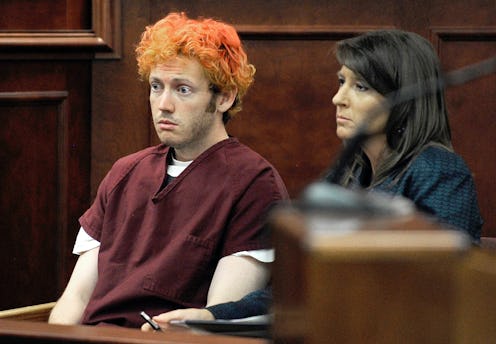News
A Video Of James Holmes Could Determine Everything
The prosecution played 22 hours of interview video footage of James Holmes during his trial Wednesday. The interview, conducted by psychiatrist William Reid, is supposed to help jurors decided if Holmes was legally sane when he killed 12 people and injured 70 others during a July 2012 mass shooting at a movie theater in Aurora, Colorado, according to the Associated Press. In the video, Holmes' voice is flat and unemotional as he tells Reid that he slipped through the emergency door exit and opened fire on the crowd for a showing of The Dark Night Rises, according to The New York Times. He told Reid he turned up the electronic music in his headphones to drown out the screams.
Reid conducted the videotaped evaluation two years after the shooting, when Holmes had already pleaded not guilty by reason of insanity and was on medication, the AP reports. The defense filed a motion for a mistrial over the video on the grounds that it amounted to compelled testimony because Reid asked Holmes to describe his actions during the attack. Judge Carlos A. Samour rejected the motion, saying court-ordered insanity exams require questions about the crime and that the defense should have objected earlier. Reid used the video to testify that Holmes was mentally ill but legally sane during the shooting.
Jurors watched as Holmes said he knew he would probably end up arrested or dead, but that he had to carry out what he called "the mission," according to the Times. When Reid asked him why he went through with the shooting if he was aware of the consequences, Holmes quietly responded, "That’s just the price you have to pay for completing the mission." Holmes also told Reid that he was worried about being stopped by police before he carried out the shooting. Reid explained why this awareness of consequences could hint at sanity, according to the Times:
It sounds like someone who is concerned about getting caught or getting stopped and in many ways wants to be caught. There’s a strong implication, I think, that he wants to be stopped from doing something wrong.
Jurors will watch almost all 22 hours of the video, which experts say could be as powerful for jurors as watching Holmes himself take the stand — a move the defense has said is unlikely to happen. Forensic psychologists say the video offers a rare and chilling glimpse into the plotting and psyche of a mass killer, but that it could definitely hurt the defense. Holmes' defense attorneys will finally have the chance to cross examine Reid on Thursday, and their goal will be to "educate jurors about why what they are seeing is more a validation of (Holmes') illness, as opposed to just being a validation of his evil," Joseph Rice, managing partner of the Jury Research Institute, a California-based trial consulting firm, told the AP.
They are looking at him as a human being and trying to interpret his soul, his character, his spirit. All those things are intangible and very subjective. If he appears to be this cold, unfeeling individual, he's a threat, he's scary, he's not a human. If jurors were to reach those conclusions, they might say this is who the death penalty is for.
If defense attorneys can spin Reid's testimony the right way, then it could ultimately help their case that Holmes was severely mentally ill, thus sparing him from the death penalty. But, that will be quite the burden. At one point in the interview, Holmes told the psychiatrist he believes he collected one "value unit" for each person who died, according to the AP. He also said he could have killed more people by shooting them in the head at close range, but that would have been too personal.
Reid considered that logic a sign of rational thinking. When Reid asked Holmes about the wounded, Holmes said flatly, "They're collateral damage, I guess," according to the AP.
The video either paints Holmes as definitely insane or definitely evil, and that interpretation will be left to attorneys and the jury. For example, at one point in the video Holmes said that before the shooting he felt “calm and collected," and afterward he felt “successful in the mission," according to the Times.
Denver defense attorney Iris Eytan, who intitially represented Holmes but is no longer involved, told the AP this might all look very bad for the defense, but that there's so much more expert testimony left. Later this month, defense attorneys will start calling their own mental health experts, at least one of whom has declared Holmes legally insane. Eytan told the AP the video won't be the end all for the trial:
It seems right now it looks really dire. They're putting up this doctor and it looks really bad. This is just the beginning. This is 30 percent of the medical testimony that's about to come out.
Images: Getty Images (4)
